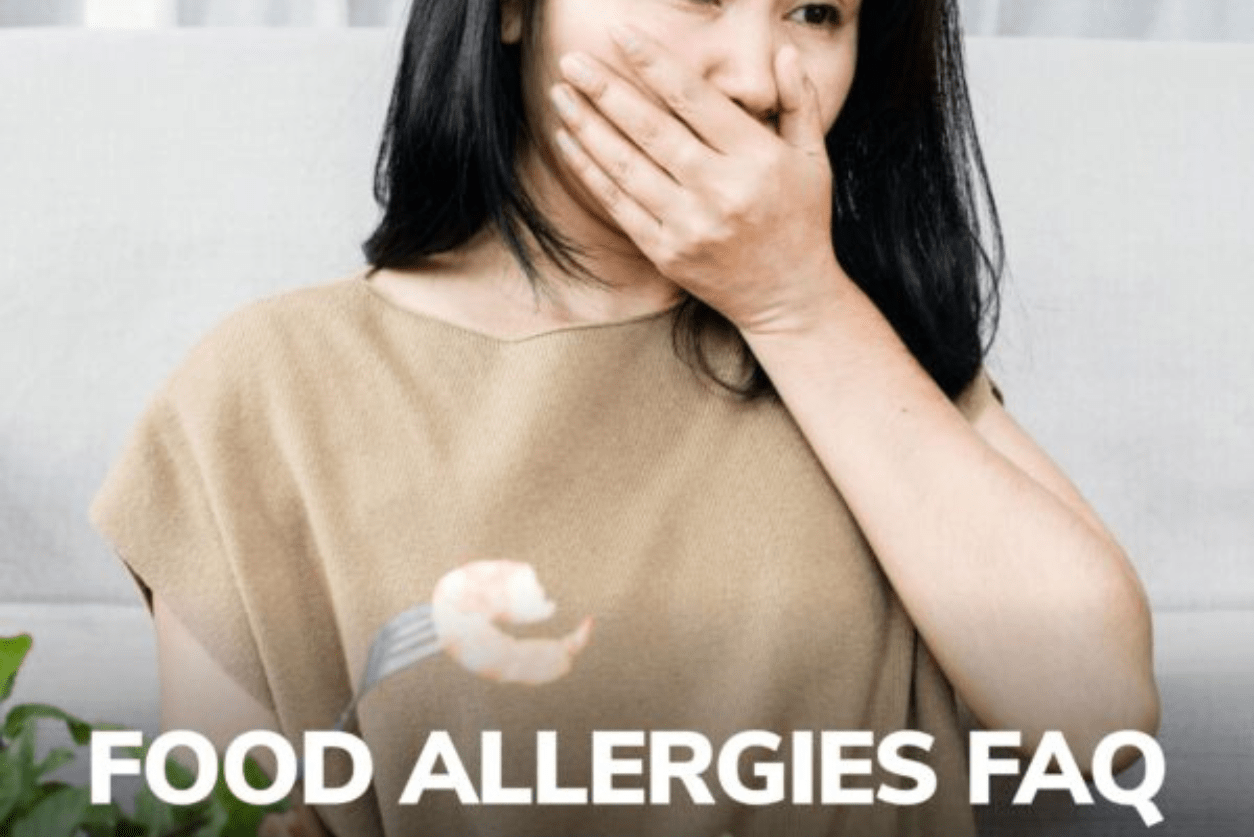
Food Allergies FAQ
With a large proportion of people affected, food allergies are a common health concern affecting people of all ages, races, and geographical regions. Food allergies can significantly affect daily life, cause discomfort, interfere with daily activities, and even pose severe health risks. Understanding food allergies is an integral part of managing your personal healthcare.
What are Food Allergies and Their Symptoms?
Food allergies occur when the body overreacts to certain foods it perceives as harmful. This overreaction of the immune system leads to symptoms that can be bothersome or even life-threatening.
Common foods that trigger allergic reactions include nuts, shellfish, dairy, eggs, wheat, and soy. It’s important to remember that any food can potentially trigger an allergic reaction.
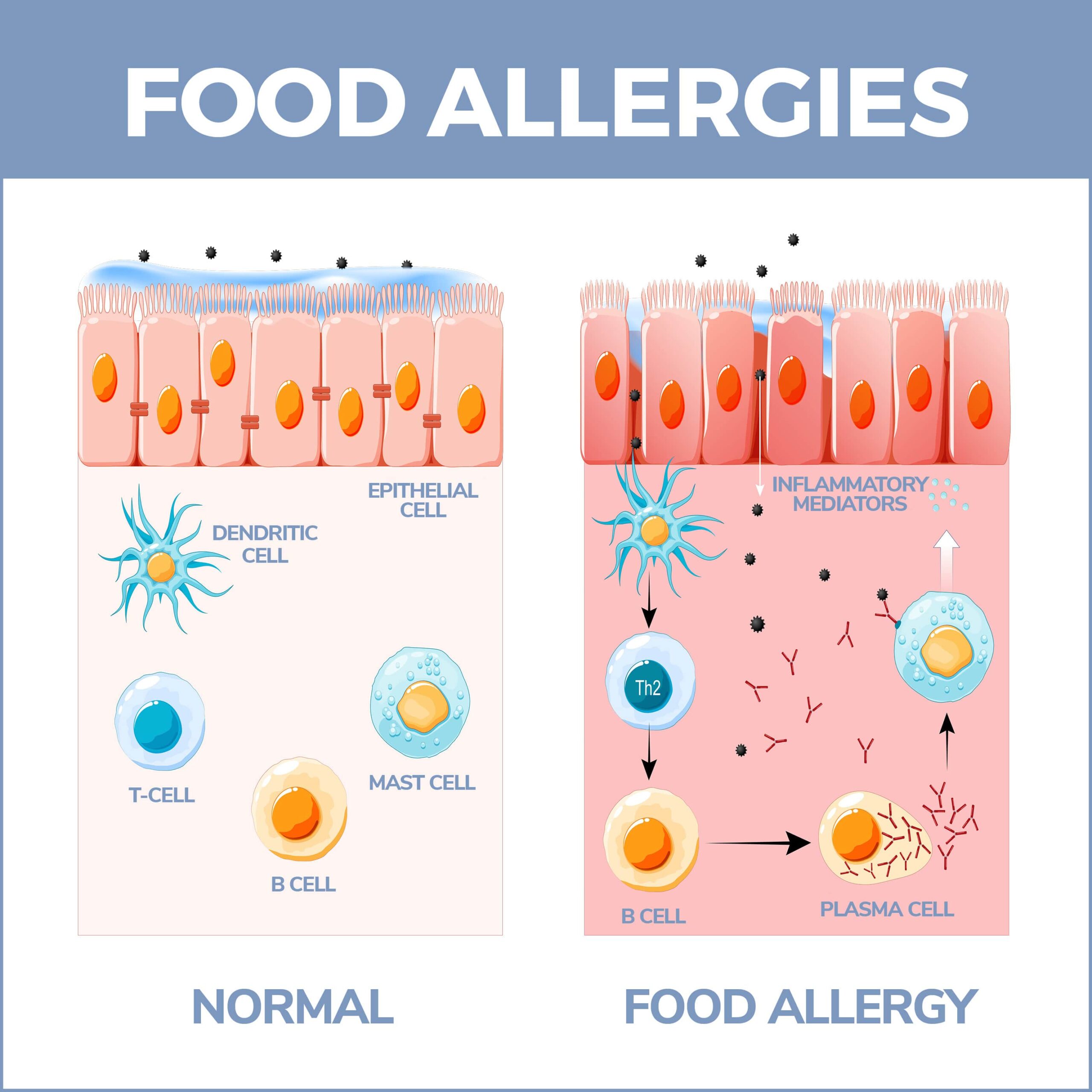
When your body reacts to a food allergen, it can cause a variety of symptoms. Here are some of the most common ones:
- Stomach cramps: One of the first reactions you may experience when consuming a food you’re allergic to is stomach cramps. This occurs as your immune system responds to what it perceives as a threat. These cramps can vary from mild discomfort to severe pain and might be accompanied by a feeling of bloating or fullness.
- Vomiting and diarrhea: In some cases, your body’s defense mechanism might be to expel the allergen as quickly as possible. This can result in nausea followed by vomiting, and in some cases, diarrhea. While unpleasant, this is a clear sign that your body has identified something in your food that it doesn’t agree with.
- Hives or rashes: Food allergies often show up as skin reactions, as your immune system releases histamines that inflame the skin. This can result in itchy, red rashes or hives – raised, red bumps appearing anywhere on the body. Besides being itchy, these hives or rashes can also burn or sting.
- Swelling: A common symptom of food allergies is angioedema, which is swelling that occurs beneath the skin, often around the lips, face, tongue, or throat. This happens when the body releases histamines into the bloodstream, causing blood vessels to expand and fluid to accumulate. The swelling can range from mild to severe, and if it occurs in the throat, it can obstruct breathing.
- Difficulty breathing: In severe cases, a reaction to a food allergen can cause anaphylaxis, a potentially life-threatening reaction that requires immediate medical attention. This can cause your airways to constrict or swell, making it difficult or even impossible to breathe. A rapid pulse, a sudden drop in blood pressure, dizziness, or loss of consciousness can also happen. If you experience these symptoms after eating, it’s crucial to seek immediate medical help.
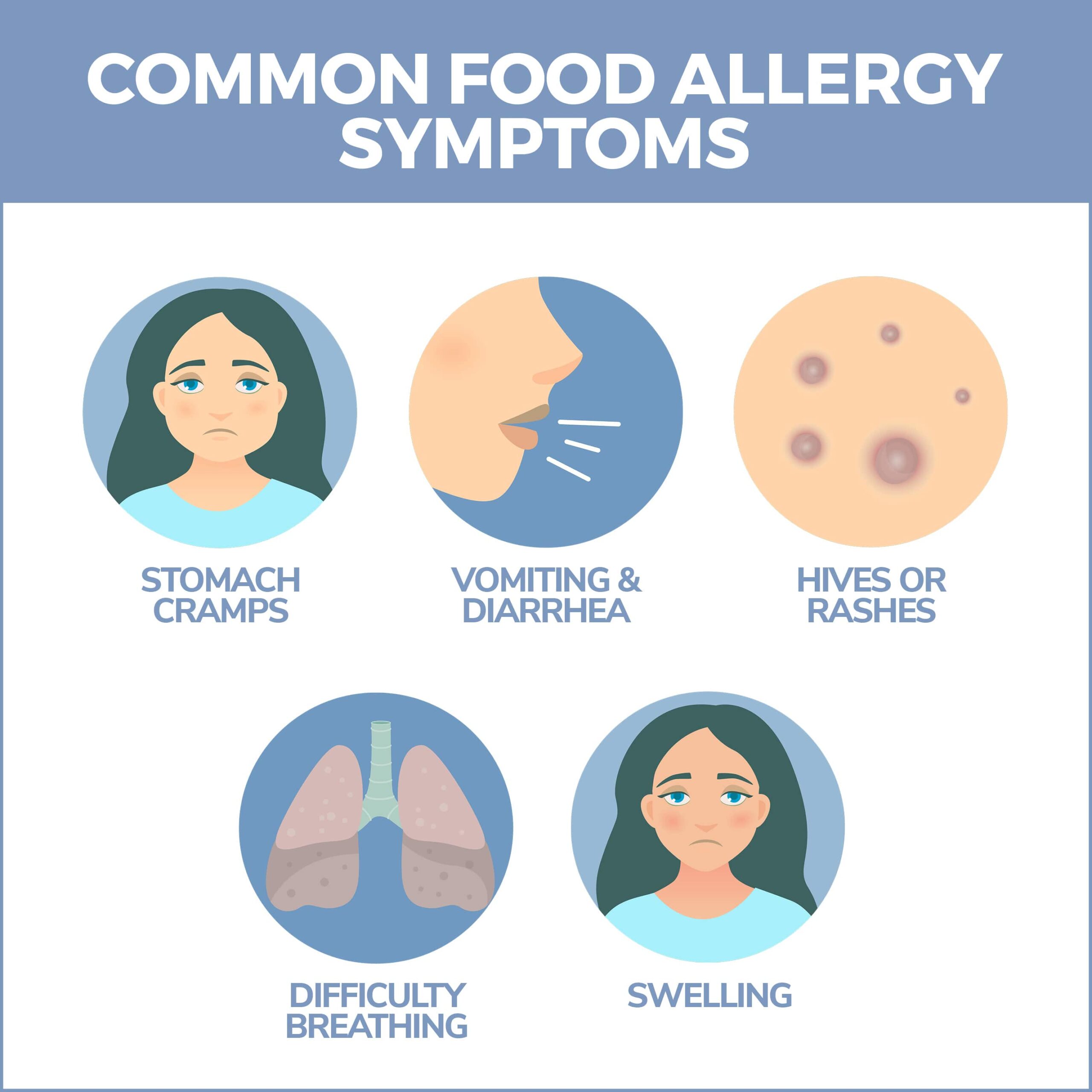
Diagnosing Food Allergies
Food allergies can be diagnosed by analyzing your symptoms, their triggers, and your family’s medical history. After the initial evaluation, further tests such as skin prick tests, blood tests, or food challenge tests may be recommended to identify the specific foods causing your symptoms.
- Skin prick tests: A small device with a tiny amount of the food allergen is used to prick your skin lightly. If you’re allergic, you’ll get a small, raised bump on your skin where it was pricked.
- Blood tests: In some cases, a blood test might be recommended. The test measures the amount of specific allergy-related antibodies (proteins your body makes when it reacts to allergens) in your blood.
- Food challenge tests: Under close medical supervision, you’ll be asked to eat a small amount of the potential allergen and then your reactions will be watched closely.
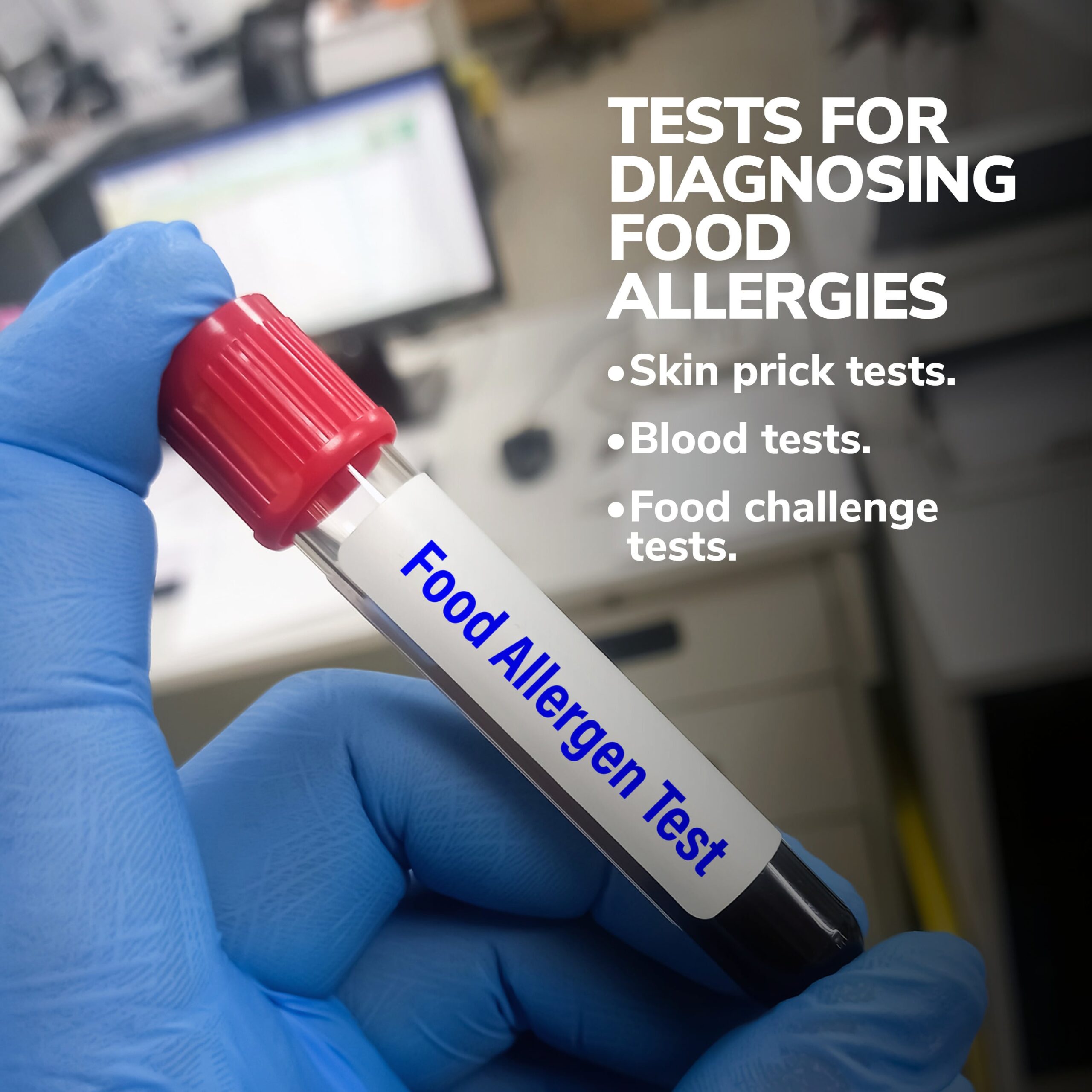
Frequently Asked Questions About Food Allergies
1. What is a food allergy?
A food allergy is an abnormal immune response to a specific food that the body mistakenly identifies as harmful. This reaction occurs every time the allergenic food is consumed, and the symptoms can vary from mild to severe. In some cases, it can lead to anaphylaxis, a life-threatening reaction.
2. What causes food allergies?
Food allergies occur when the immune system mistakenly perceives a harmless substance, typically a protein in food, as a threat. The immune system produces specific antibodies (Immunoglobulin E or IgE) to fight the perceived threat or allergen. These antibodies trigger the release of certain chemicals like histamine, causing an allergic reaction that can affect the respiratory, gastrointestinal tract, skin, or cardiovascular systems.
3. What are common food allergens?
The most common food allergens, often referred to as the ‘Big Eight,’ are dairy (mainly in cow’s milk), eggs, tree nuts (like almonds, walnuts, cashews), peanuts, shellfish (like crab, lobster, shrimp), wheat, soy, and fish. These foods account for about 90% of all food allergies but nearly any food can trigger an allergy.
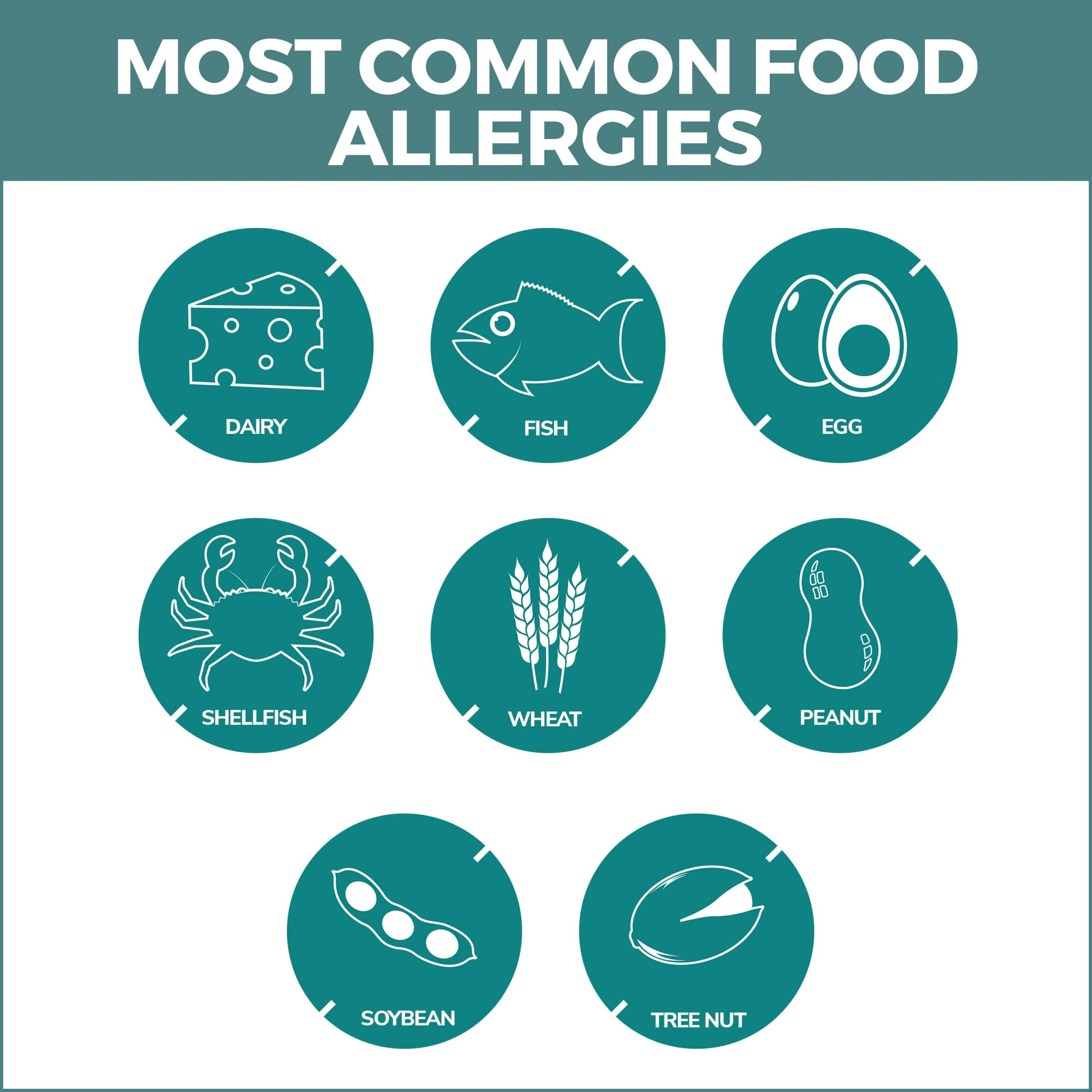
4. How are food allergies diagnosed?
Food allergies are typically diagnosed through a combination of a patient’s medical history, an evaluation of symptoms and their triggers, and allergy tests administered by a healthcare provider. Tests may include skin prick tests, blood tests, or food challenge tests.
5. Can food allergies be cured?
There is currently no cure for food allergies. They can often be managed through a combination of allergen avoidance and medications to treat symptoms when accidental exposure occurs. Epinephrine is the first-line treatment for severe reactions or anaphylaxis. Some individuals may be candidates for oral immunotherapy, a treatment that can reduce the severity of reactions over time by gradually increasing the amount of allergen consumed under medical supervision.
6. Can you develop food allergies later in life?
Yes, it’s possible to develop food allergies at any age, including adulthood. Some allergies may also fade over time, while others remain throughout a person’s life. Changes in our environment, diet, exposure to allergens, and the state of our immune system can all contribute to developing allergies later in life.
7. What’s the difference between a food allergy and food intolerance?
A food allergy involves the immune system and can cause a range of severe symptoms, potentially affecting many organs in the body. In contrast, food intolerance is usually less severe and often limited to digestive problems such as bloating, gas, or diarrhea. Food intolerances do not involve the immune system, are generally dose-dependent (symptoms occur based on the amount of food consumed) and may be due to enzymatic deficiencies or reactions to food additives.
8. What is anaphylaxis?
Anaphylaxis is a severe, potentially life-threatening allergic reaction. It can occur within seconds or minutes of exposure to an allergen, including certain foods. Symptoms can include a rapid, weak pulse, skin rash, nausea, vomiting, difficulty breathing, and loss of consciousness. If not treated immediately with an injection of epinephrine and followed by medical attention, anaphylaxis can be fatal.
Treatment Options for Food Allergies
Several treatment options for food allergies are available depending on the specific food allergen, the severity of the allergy, and the individual’s medical history. These include:
- Avoidance: The most effective way to manage food allergies is to avoid the food causing the reaction.
- Medications: Over-the-counter and prescription medications can be used to treat symptoms of accidental exposure. These can include antihistamines, corticosteroids, and in severe cases, adrenaline (epinephrine).
- Immunotherapy: This treatment aims to desensitize the body to the food allergen by giving small, gradually increasing amounts of the food allergen over a period under close medical supervision. It’s not suitable or available for all types of food allergies.
- Epinephrine: An immediate injection of epinephrine is required for severe allergic reactions (anaphylaxis). People with severe food allergies should always carry an epinephrine auto-injector (e.g., EpiPen).
- Allergy action plan: Your healthcare provider can help you create an action plan detailing what to do in case of accidental exposure to a food allergen. This plan should be shared with those around you, such as family members, teachers, and colleagues.
Contact Us
While food allergies can be disruptive, they can also potentially lead to serious health complications. If you’ve been dealing with gastrointestinal issues, don’t postpone seeking help. The experienced team at Gastroenterology of Greater Orlando is ready to provide precise diagnoses and effective treatment plans. To prioritize your gut health, get in touch with us today!